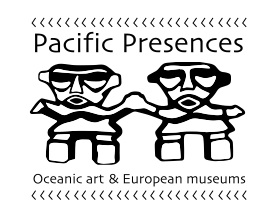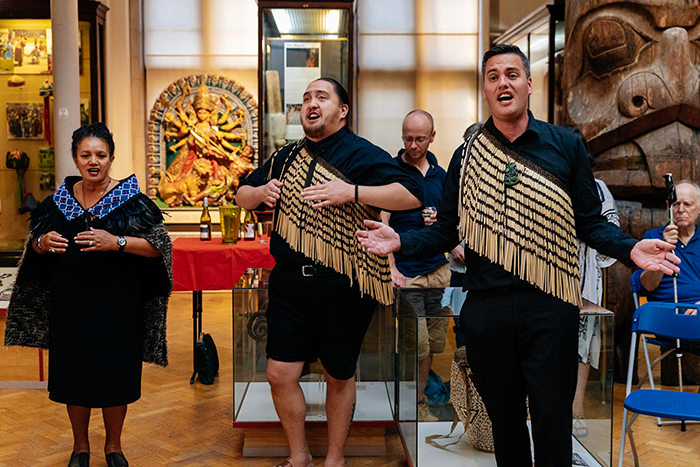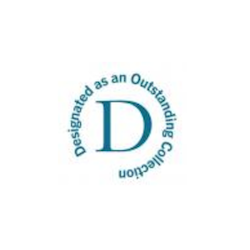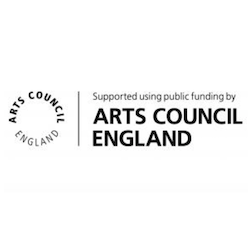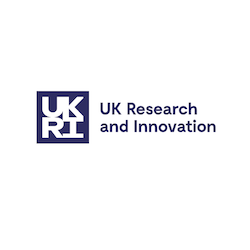Oceanic art and European museums
European Research Council 2013-2018
This project explored major ethnographic collections that entered European museums during the nineteenth and early twentieth centuries, and have remained largely unstudied since. Focussing on materials from the Pacific that are now in museums in Russia, Germany, the Netherlands, France and the United Kingdom, it used innovative cross-disciplinary methods to advance understandings of materiality, cross-cultural history, and museum policy and practice in Europe today. A team of researchers based in Cambridge investigated Oceanic collections across a range of European museums, including those at MAA, in unprecedented depth. The project worked with a network of collaborators, including elders and community members in the Pacific Islands, and contemporary artists, providing a range of expert, customary, and experimental perspectives upon art works and genres, and upon the questions raised by collection histories and museum environments. The project aims were to:
-
theorise collections as complex, relational assemblages, never simple samples of local material cultures
-
use comparative methods to understand both the arts of Oceania and the making of European collections and museums. We will analyse and compare British, Dutch, French, German and Russian collecting histories and ask how and why these enterprises resulted in distinctive collections and museums;
-
propose new, powerfully historicised approaches to presentations of Oceanic art, and world cultures generally, appropriate to the European museums of the twenty-first century.
Pacific Currents: New Displays from Oceania in the World Anthropology Gallery
A new permanent display which opened in 2018, Pacific Currents showcases MAA's exceptional and wide ranging Oceanic collections, which originate from throughout the Pacific and date from the late 18th Century to the present day. Unlike previous displays which were organized according to country of origin, this re-display highlights the dynamic nature of communities, while acknowledging people's close attachment to and knowledge of local environments.
The displays draw on extensive collaborative research for over a decade, supported by major grants from the Arts and Humanities Research Council and the European Research Council, including ‘Artefacts of Encounter’ (2010 – 2013) and ‘Pacific Presences’ (2013 – 2018) led by Nicholas Thomas, and the ‘Fijian Art Project’ (2011-2014) led by Steven Hooper in collaboration with Anita Herle at MAA. Museum staff and project researchers have worked with communities in the Pacific and numerous Pacific Islanders and specialists have come to MAA to study the collections. The re-display of the Pacific collections is part of a larger ‘Pacific Currents in Cambridge’ Outreach Project.
At the Private View for the new displays on 5 July 2018 MAA was honoured by a powerful ceremonial welcome and blessing by Otene Hopa, Ray Wen and David Jones, members of Ngāti Rānana(the London Maori Club). Guests were also treated to a performance of Kiribati dance with Krista Dixon and Chloe Karea.
Belonging by Alana Jelinek
Belonging is an artwork by Alana Jelinek. She is responsible for public engagement and is a senior researcher on the Pacific Presences project.
This is the first in a series of podcasts edited and conceived by Alana Jelinek. The podcasts together explore the question of ethnographic museums and whether we can understand the hundreds of thousands of objects from Oceania that are now in Europe as being in a diaspora. They also explore how meanings and sympathies shift depending on what is juxtaposed, or heard first.
With Rodney Kelly, Julie Adams, Maria Stanyukovich, Oliver Leub, Pala Molisa, Wayne Modest, Reina Sutton and Lilja Kupua Addeman.
Photo by Alana Jelinek
With Kat Szabo, Insos Ireeuw, Alisa Vavataga, Emelihter Kihleng, Sean Mallon and Pandora Fulimalo Pereira.
Photo by Mark Adams
With Sana Balai, Kaetaeta Watson, Liz Bonshek, Alisa Vavataga, Pandora Fulimalo Pereira, Pala Molisa, Maria Stanyukovich, Nina Tonga, and Imelda Miller.
Photo by Mark Adams
With Liz Bonshek, Maria Stanyukovich, Pala Molisa, Imelda Miller, Jackie Shown, and Rodney Kelly
Photo by Mark Adams
With Wonu Veys, Liz Bonshek, Maria Stanyukovich, Sean Mallon, Ole Maiava, Kolokesa Māhina-Tuai, and Oliver Lueb.
Photo by Alana Jelinek
With Emelihter Kihleng, Liz Bonshek, Insos Ireeuw, Lilja Kupua Addeman, Alisa Vavataga, Maria Wronska Friend, Kat Szabo, Julie Adams, Reina Sutton, Ole Maiava, Wonu Veys, Rick Pa, and Wayne Modest.
Photo by Mark Adams
This is the first time the podcast is edited so that no one identifies who they are. It is compiled using recordings of Rodney Kelly, Liz Bonshek, Julie Adams, Oliver Lueb, Maria Stanyukovich, Fuli Pereira, Wayne Modest, Kat Szabo, Ole Maiava, Maria Wronska Friend, Reina Sutton, and Nina Tonga.
Photo by Mark Adams
This is the most experimental edit so far and the second time the podcast has been edited so that no one identifies who they are. It is compiled using recordings of Rodney Kelly, Imelda Miller, Julie Adams, Oliver Lueb, Maria Stanyukovich, Kat Szabo, Maria Wronska Friend, Lilja Kupua Addeman, Insos Ireeuw, Jackie Shown, Kaetaeta Watson, Ole Maiava, Sana Balai, Rick Pa, Fuli Pereira, and Liz Bonshek.
Photo by Mark Adams
This is the third time the podcast is edited so that no one identifies who they are. If you have listened to the other 8, you may be able to identify each speaker. This edit questions whether it is important to know who is speaking and from what institution they speak. The next podcast, Belonging009(2), will include people’s names to test whether naming the person speaking, authorship, is important in how we understand. The podcast is compiled using recordings of Julie Adams, Lilja Kupua Addeman, Reina Sutton, Kaetaeta Watson, Kolokesa Māhina-Tuai, Liz Bonshek, Fuli Pereira, Maria Stanyukovich, Wayne Modest and Pala Molisa.
Photo by Mark Adams (and reversed below)
With Reina Sutton, Fuli Pereira, Rodney Kelly, Wayne Modest, Liz Bonshek, Pala Molisa, Sana Balai, Maria Wronska Friend, Imelda Miller, Nina Tonga and Jackie Shown.
Photo by Mark Adams
The final podcast in the series was made using recordings by Julie Adams, Lilja Kapua Addeman, Susanna Rianna Balai, Liz Bonshek, Insos Ireeuw, Rodney Kelly, Emelihter Kihleng, Oliver Lueb, Kolokesa Māhina-Tuai, Ole Maiava, Sean Mallon, Imelda Miller, Wayne Modest, Pala Molisa, Rick Pa, Pandora Fulimalo Pereira, Jackie Shown, Maria Stanyukovich, Reina Sutton, Kat Szabo, Nina Tonga, Alisa Vavataga, Wonu Veys, Kaetaeta Watson, and Maria Wronska Friend
Photo by Mark Adams
And for further information about Alana Jelinek’s previous and ongoing work with ethnographic museums and collections, please see http://www.alanajelinek.com


